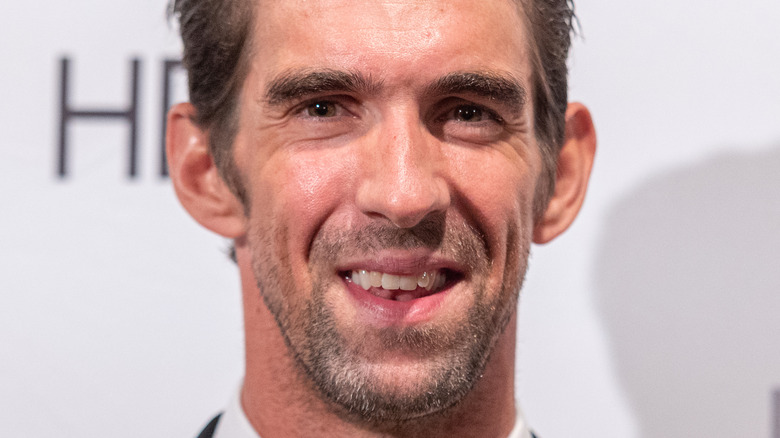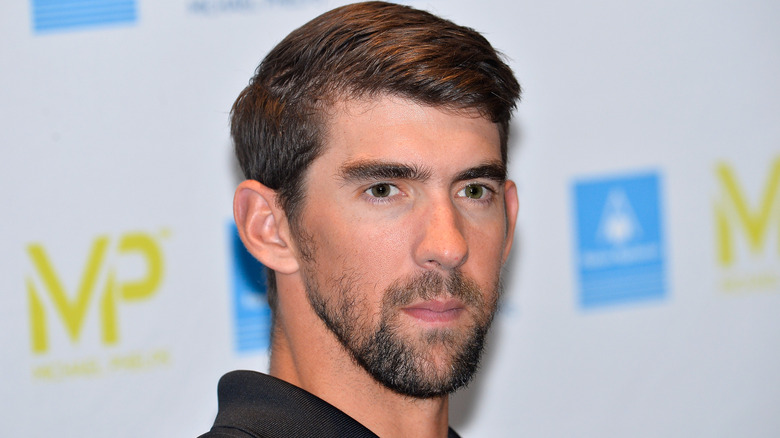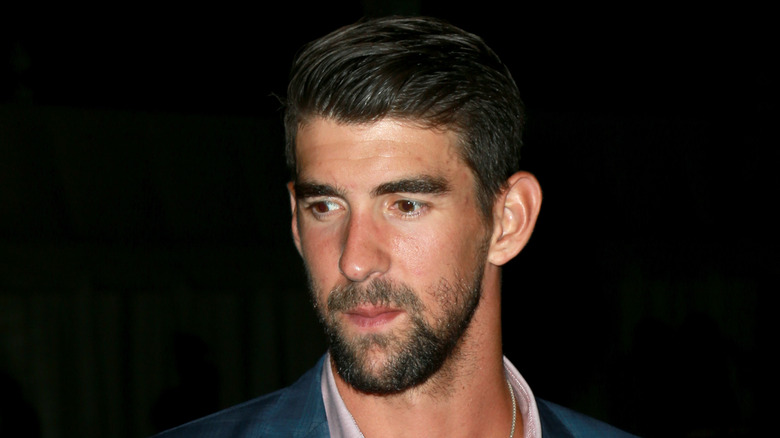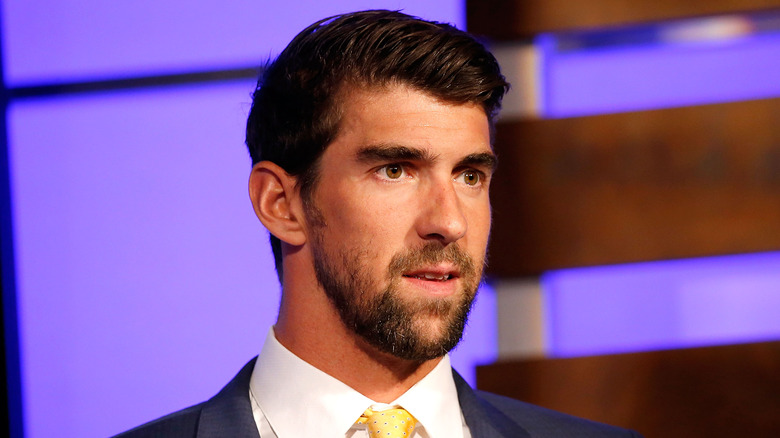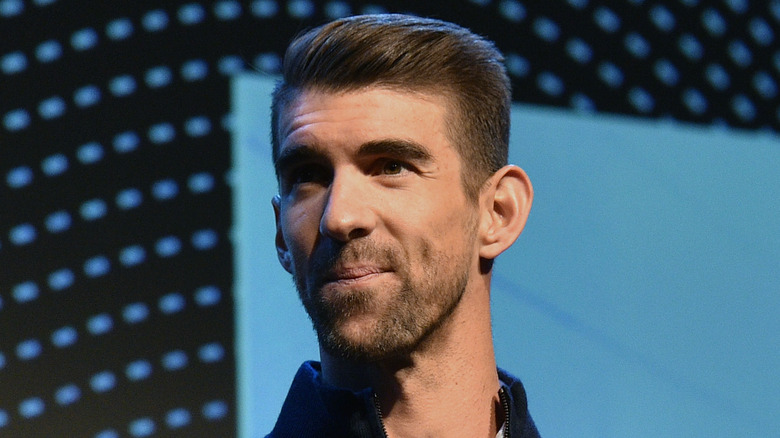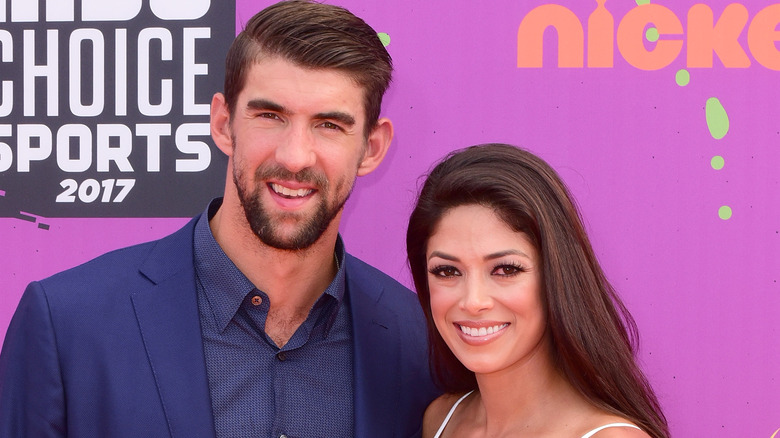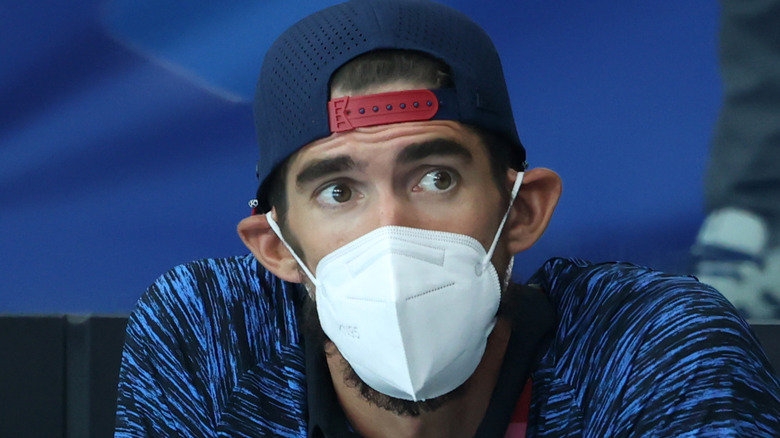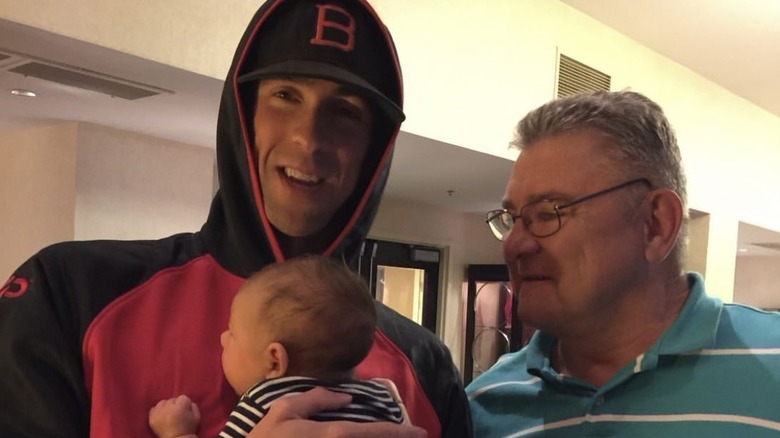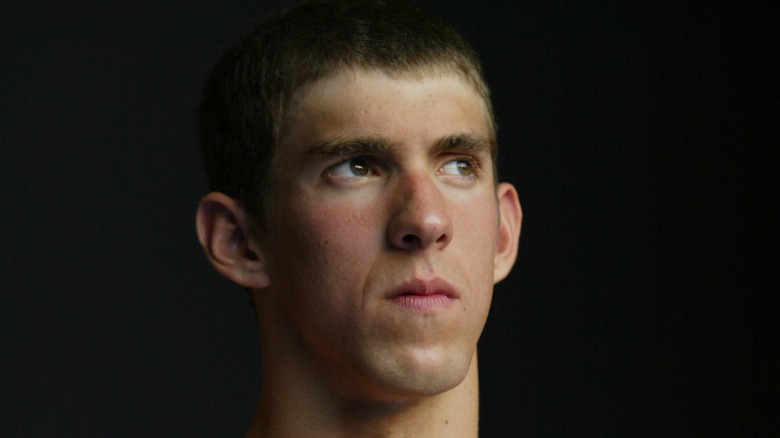Tragic Details About Michael Phelps
The following article mentions suicide and substance abuse.
It's hard to associate Michael Phelps with anything other than winning since the former competitive swimmer is the most decorated American Olympic athlete of all time. The Baltimore, Maryland native has 23 gold medals under his belt, as well as three silver and two bronze, all of which he won at five Summer Games. Phelps had begun swimming at age seven and was only 15 years old when he competed in his first Olympics on the U.S. swimming team in 2000.
In 2016, after competing in the Rio Games, Phelps announced he was retiring from swimming and later didn't take part in the 2021 Tokyo Olympics. However, he did admit on "Today" that he wasn't entirely opposed to competing again, particularly in the 2028 Olympics, if it's what his children wanted. He explained, "If my boys, at some point, ask when I'm going to or why I'm not competing, we'll see what the answer is then."
These days, Phelps appears to be focusing on his charity, the Michael Phelps Foundation, as well as his mental health advocacy. For Phelps, that work is personal since he had to overcome a lot of obstacles in life. Yet he told the "Allison Interviews" podcast, "If it had to take me going through some of the scariest moments to look at myself and love who I see today, then it is all okay." So what did Phelps have to go through to get to where he is now? Let's break down the tragic details of Michael Phelps.
Michael Phelps has depression and anxiety
Michael Phelps has been very vocal about mental health after dealing with anxiety and depression throughout his swimming career. He recalled at the Kennedy Forum, per CNN, "Really, after every Olympics, I think I fell into a major state of depression," adding that he first experienced it in 2004. The gold medalist reflected on why that may have happened to Healthline, saying, "[You] work so hard for four years to get to that point, and then it's like you're ... at the top of the mountain, you're like what the hell am I supposed to do?"
Yet it seems it took Phelps some time to acknowledge that he was suffering emotionally. "As a male athlete, I always thought it was a sign of weakness if I showed I was being vulnerable," he shared at the SHRM Annual Conference & Expo. He also admitted that he was used to compartmentalizing and pushing down his feelings before eventually realizing that he needed professional help. "I think for a long time I looked at myself as a swimmer and not a human, so being able to learn more about me, how I worked, why I work that way through treatment," Phelps said.
That doesn't mean that Phelps doesn't still struggle. He admitted on the "Allison Interviews" podcast, "My scariest days are dark ... It feels like the whole world is out to get me. " When that happens, Phelps relies on swimming and exercise which are therapeutic for him, as well as taking time for himself.
If you or someone you know needs help with mental health, please contact the Crisis Text Line by texting HOME to 741741, call the National Alliance on Mental Illness helpline at 1-800-950-NAMI (6264), or visit the National Institute of Mental Health website.
The Olympian contemplated suicide
It appears there were times that Michael Phelps contemplated suicide because of his mental health problems. He recalled at the Kennedy Forum, per CNN, that it happened after the 2012 Olympics, with him saying, "I didn't want to be in the sport anymore ... I didn't want to be alive anymore." Things seemed to only get worse after his 2014 DUI arrest when he refused to leave his home or see people. He explained on "Today," "I just didn't want to be alive ... I saw myself as letting so many people down — and myself, in particular."
Yet, it seems it was hitting rock bottom that made Phelps understand that he needed to get help. "I finally realized that I can ask for help, and it's okay not to be okay," he said. Despite Phelps seeking treatment, his family still worries when he goes through deep depression spells. His wife, Nicole Phelps, admitted to Today Parents, "After Vanessa (Bryant) lost Kobe, all I could do was look at Michael and be like, 'Can we please help you? Because if I lose you, I don't know what I'm gonna do.'"
Phelps now knows firsthand how important it is to spread awareness. "That's the reason why suicide rates are going up — people are afraid to talk and open up." And he's using his experiences to help others, telling Healthline, "I do know what that feels like to not want to be alive ... I also know ... there is light at the end of the tunnel."
If you or anyone you know is having suicidal thoughts, please call the National Suicide Prevention Lifeline by dialing 988 or by calling 1-800-273-TALK (8255).
Michael Phelps dealt with substance abuse
It seems that Michael Phelps' struggles with his emotional health led to substance abuse issues. Per CNN, he explained at the Kennedy Forum, "It would be just me self-medicating myself, basically daily, to try to fix whatever it was that I was trying to run from." He reiterated on the "Allison Interviews" podcast how drugs and alcohol kept him from dealing with his pain, saying, "I was trying to escape and numb myself, and I was trying to get away from everybody." Yet he acknowledged it also had a deeper meaning, adding, "I think some of the things I did were really my cries for help."
While Phelps was arrested for a DUI in 2004, it was his second DUI arrest in 2014 that apparently made him realize he was going down a dark path. He reflected on "Today," "I set myself down a downward spiral." The swimmer then checked himself into rehab but admitted even after completing treatment, he didn't know if he was an alcoholic. He explained, "I know I have probably moments where I have gone off the deep end when I know I shouldn't."
Regardless of how he labels himself, Phelps seems to abstain from alcohol these days but for different reasons. He revealed, "We don't drink in our household at all. There are some bad childhood memories of my father [drinking]." He added, "I'm somebody who is very conscious of not having my boys go through some of the same things that I lived through."
If you or anyone you know needs help with addiction issues, help is available. Visit the Substance Abuse and Mental Health Services Administration website or contact SAMHSA's National Helpline at 1-800-662-HELP (4357).
The swimmer was involved in scandals
Michael Phelps has been involved in his fair share of scandals over the years that didn't just damage his reputation but put a strain on his emotional well-being. The most damaging public incidents for Phelps seemed to be his arrests, with him getting charged with DUIs in both 2004 and 2014. Since his first arrest happened when he wasn't as famous, his second DUI appeared to have more of an impact on his career. USA Swimming even released a statement, saying, "His actions are disappointing and unquestionably serious," as did the CEO of the U.S. Olympic Committee, who publicly stated he was "disappointed on a number of fronts," per USA Today.
Those kinds of reactions also seemingly impacted Phelps' mental health, with him dishing on the "Allison Interviews" podcast, "Just the feeling of letting so many people down ... That was the bottom of my bottom." That wasn't the first time that Phelps had to deal with disappointing people either since in 2009, photos of him allegedly smoking marijuana were leaked to the tabloids. That got him suspended from USA Swimming for three months and cost him his Kellogg's contract, according to The New York Times.
While Phelps told "Today," "I knew that I'd made a mistake," he also acknowledged that the incident made him learn who he could trust. Nowadays, Phelps mostly stays out of the headlines, dishing, "At this point, my wife and I live our lives how we want and don't really let anything affect that ... We are homebodies."
Michael Phelps has had relationship problems
Michael Phelps may be happily married to model Nicole Phelps, née Johnson, since 2016, but they have had to overcome many obstacles in their relationship. In 2015, Phelps told USA Today, "Her and I have been on and off for eight years ... We've been through a lot." Yet he added, "We've been able to grow as a couple through everything we've been through." One thing they went through was break ups, which they each apparently took hard. Johnson even told Cosmopolitan, "There definitely were times, and I think Michael would say the same thing, where I hated him. We were at odds at times."
While the two found their way back to each other, they still had other issues, like their relationship taking a backseat to Phelps' career. "It's good and bad that Michael had to put swimming before us in a lot of instances, but there's also a very high level of understanding on my behalf," Johnson said.
Their biggest struggle seems to be Phelps' mental health issues. Johnson revealed to Today Parents, "I used to think, 'Oh, I can fix him. I can be his therapist. I can be what he needs." She continued, "But what I've learned is that you can't take ownership for how they're feeling, no matter how badly you want to." It appears that Phelps grapples with being a burden, too, admitting, "She wants me to get better. But she's struggling herself. She needs that support as well. I know it's hard for her."
Michael Phelps struggled during the pandemic
It's no secret that the COVID-19 pandemic was hard on everyone, with some struggling more than others, including Michael Phelps. In early 2021, he revealed to Insider, "I'll be the first to admit my mental health has been scarier than it's ever been throughout all of this." For Phelps, one of the hardest parts was all the changes it made to his daily life since he couldn't travel for work. He explained to USA Today, "Whenever I get out of a routine, I kind of spiral. There were massive significant changes for me, so my emotional and mental health kind of went on a roller coaster throughout everything."
Yet Phelps apparently knew he had to be strict with his regimen regardless. He dished, "My mind works on having five, six days ... usually seven days a week of some kind of working out." Phelps also reached out for support, telling CNBC, "I'm talking to my therapist and talking to my friends more, calling family members more ... because I want to try and feel as normal as I can."
However, the extra time at home did have other challenges. Phelps dished on the "Allison Interviews" podcast, "Being together during this quarantine ... it's been some more difficult times, and my wife and I have probably pressed each other's buttons." However, that seemingly benefited him too, with Phelps reflecting, "I was actually afraid as hell of going through this quarantine process and some of our conversations that have come up ... but that's part of growing up."
If you or someone you know needs help with mental health, please contact the Crisis Text Line by texting HOME to 741741, call the National Alliance on Mental Illness helpline at 1-800-950-NAMI (6264), or visit the National Institute of Mental Health website.
Michael Phelps' father died after they reconnected
Michael Phelps had to deal with a tragic loss in October 2022 when his father, Fred Phelps, died. The mental health advocate mourned his father on Instagram, writing, "You'll always be my dad. And I'll always be your son ... Love you, dad and I will miss you." What makes this even more tragic is that Phelps had only just reconciled with his father after his 2014 rehab stint, following years of estrangement that resulted from his parent's divorce. The swimmer had admitted to Sports Illustrated, "I felt abandoned ... I would like to have a father in my life, and I've been carrying that around for 20 years."
By 2015, Phelps and his dad had appeared to be in a good place. "Our relationship is really great, and it's continuing to grow. We've learned that we have a lot in common," Phelps said. Therapy also helped Phelps realize that a lot of his personal struggles had stemmed from their fractured relationship. He explained on the "Allison Interviews" podcast, "Once I dealt with all of that, and I got through that, it just kind of got easier."
Phelps also acknowledged that becoming a father himself had helped him understand his dad more. "I've realized that was the best my father could have done," he told ESPN. From the looks of Phelps' Instagram, it seems he and his father were close enough in recent years for Fred to spend some time with his grandchildren before his death, which hopefully brought Phelps some solace.
The gold medalist had difficulties growing up
Michael Phelps had a difficult time growing up, not only because of his previously mentioned damaged relationship with his father but because he also struggled at school. He was eventually diagnosed with ADHD, which he says made his childhood much harder. He revealed to the Child Mind Institute, "I [saw] kids who, we were all in the same class, and the teachers treated them differently than they would treat me." He added, "I had a teacher tell me that I would never amount to anything and I would never be successful."
Phelps apparently also felt isolated from his friends when taking his medication at the nurse's office every day. His mother recalled to The New York Times that he said, "I don't want to do this anymore, Mom. My buddies don't do it." While Phelps went on to learn how to cope with his ADHD through swimming, his success in the sport came with a downside in his teens. He explained on the "Allison Interviews" podcast, "It's difficult to start a journey at such a young age when you miss so much of your developmental stages ... I was competing with 30-year-old men and expected not to be a 15-year-old kid but a grownup." He continued, "At some point, I just got numb by it all."
Phelps has clearly come a long way on his mental health journey since then and is using his tragic experiences to help others, proving he is much more than just a talented swimmer.

